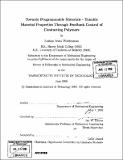Towards programmable materials : tunable material properties through feedback control of conducting polymers
Author(s)
Wiedenman, Nathan Scott
DownloadFull printable version (53.28Mb)
Alternative title
Tunable material properties through feedback control of conducting polymers
Other Contributors
Massachusetts Institute of Technology. Dept. of Mechanical Engineering.
Advisor
Ian W. Hunter.
Terms of use
Metadata
Show full item recordAbstract
Mammalian skeletal muscle is an amazing actuation technology that can controllably modify its force and position outputs as well as its material properties such as stiffness. Unlike muscle, current engineering materials are limited by their intrinsic properties, dictated at the molecular level.This work is focused on developing an integrated device, called a programmable material, which mirrors the capabilities of natural co-fabricated controlled actuation systems such as muscle. While such a device may have the external appearance of a homogeneous material, it can possess unique properties not existing in any currently manufactured material. When actuation, sensing, and control capabilities are integrated within a closed-loop system, the mechanical properties of the system such as stiffness, viscosity, and inertia will arise from the dynamics of the feedback loop rather than from any inherent mechanical properties of the materials from which the device was fabricated. Moreover, these properties may be 'tuned' by altering the feedback parameters embedded in the material system. With this approach properties such as negative stiffness may be generated which do not exist in bulk materials.The most promising of the existing artificial muscle technologies is actuation with conducting polymer. Additionally, conducting polymer has been used to fabricate the position sensor and control electronics. Creating these components from a single type of material has made it possible to co-fabricate the system into an integrated device. This is the first research to attempt to create a co-fabricated, fully integrated conducting polymer feedback device. This work establishes the feasibility of building the device and answers many of the questions of fabrication and design.
Description
Thesis (Ph. D.)--Massachusetts Institute of Technology, Dept. of Mechanical Engineering, 2008. Includes bibliographical references (p. 159-168).
Date issued
2008Department
Massachusetts Institute of Technology. Department of Mechanical EngineeringPublisher
Massachusetts Institute of Technology
Keywords
Mechanical Engineering.